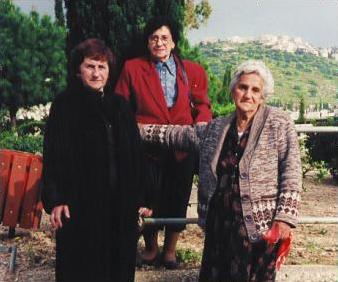|
|

|
Shalosh ahayot
Drei Schwestern Three Sisters Tsipi Reibenbach Israel 1998 Produktion/production company: Tsipi Productions, ZDF, Israel Broadcast Authority Weltvertrieb/world sales: Tsipi Productions 4/40 Eliahu Hakim St., 69120 Tel Aviv, Israel Tel.: (97-23) 6428073, Fax: 6415115 Buch/screenplay: Tsipi Reibenbach Kamera/cinematography: Roni Katsenelson, David Gurfinkel, Yoram Milo Ton/sound: Amir Buberman, Dani Matalon Schnitt/editor: Era Lapid Format: 16mm, Farbe/colour Länge/running time: 67 Minuten/minutes |
Delphi-Filmpalast Sa 21.2. 14.30 OmU Kino 7 im Zoo-Palast Sa 21.2. 20.45 OmU Akademie der Künste So 22.2. 14.00 OmU Arsenal So 22.2. 20.00 OmU | |
|
''Meine Mutter und meine beiden Tanten sind Schwestern. Karola ist mit achtundsiebzig Jahren die Älteste. Ester ist die Jüngste, sie ist siebzig. Meine Mutter, Fruma, ist fünfundsiebzig Jahre alt. Die drei haben den Holocaust in Arbeitslagern überlebt. Auch nach fünfzig Jahren sind sie nicht in der Lage, über ihre Erfahrungen zu sprechen. Dies ist ein Film über ihr Trauma. Jetzt sind sie drei ältere Frauen. Karola ist bereits seit elf Jahren verwitwet und hat die Lust am Leben vor Jahren verloren. Sie wohnt in einem Altersheim. Anders als Karola versucht Ester, zwischen den Besuchen bei ihrem gelähmten Mann ihr Leben zu genießen. Sie liebt das Meer, Soap-operas und das Kartenspiel. Fruma ist hauptsächlich damit beschäftigt, zum Arzt zu gehen und Arzt-Besuche für ihren kranken Mann abzusprechen. Drei ältere Schwestern, die von Zeit zu Zeit telephonieren und nicht nur mit ihrer Einsamkeit fertigwerden, sondern auch mit den Schatten ihrer Vergangenheit, der sich auch nach fünfzig Jahren nicht in den Hintergrund drängen läßt. Drei Schwestern handelt von Menschen, deren Zeit abläuft, die sich im Alter vor dem Tod fürchten. Es ist ein Film über ein ganzes Leben und auch über den Tod und das Ende einer Generation, die in der nahen Zukunft nicht mehr bei uns sein wird. Während der Dreharbeiten ist Esters Ehemann gestorben, und Karola hat versucht, sich umzubringen.'' Tsipi Reibenbach Tsipi Reibenbach, geb. 1947 in Polen. 1950 Emigration mit ihren Eltern nach Israel. Studium der Mathematik und Physik, danach von Film, Fernsehen und Animation. Filme seit 1978, u.a. 1981: Widow Plus (1981), Habehira vehagoral (Choice and Destiny, Forum 1994). |
''My mother and my two aunts are sisters. Karola, the eldest is 78 years old. Ester, the youngest is 70 years old. Fruma, my mother, is 75 years old. They survived the slave labour camps during the Holocaust. More than fifty years have passed since then, and still, they can't tell their story. It's a film about their trauma. The film documents the present. They are now three elderly women. Karola, who has been a widow for eleven years, lost interest in her life years ago. She now lives in an old age home. Between visits to her paralysed, sick husband, Ester tries to enjoy life every possible way. She loves the sea, TV soap operas, and playing cards. Fruma is primarily occupied with medical check-ups and making appointments with doctors for her sick husband. Three elderly sisters, communicating by phone, coping not merely with loneliness, but also with memories which refuse to go away, even after more than fifty years. Fruma is writing her memoirs. She and Karola were in the same camp. Karola is unwilling and unable to talk about the past or the present, afraid to collapse if she were to touch the trauma of her life. Ester is searching for her lost youth. She was a teenager in the slave labour camp. They all married right after the war and had children. Now, suddenly, they have become old. They live a lifeless life. 'Life has passed and we achieved nothing.' It's a film about people running out of time, about being old and afraid of death. It's a film about a whole life, but also a film about death, the end of life of a generation, which, in the near future, won't be with us anymore. While shooting the film, Ester's husband died and Karola tried to commit suicide.'' Tsipi Reibenbach |

